This article needs additional citations for verification .(September 2013) |
| |||||
| Decades: | |||||
|---|---|---|---|---|---|
| See also: | Other events of 2008 List of years in Belgium | ||||
The following lists events that happened during 2008 in the Kingdom of Belgium .
This article needs additional citations for verification .(September 2013) |
| |||||
| Decades: | |||||
|---|---|---|---|---|---|
| See also: | Other events of 2008 List of years in Belgium | ||||
The following lists events that happened during 2008 in the Kingdom of Belgium .

Christian Democratic and Flemish is a Flemish Christian-democratic political party in Belgium. The party has historical ties to both trade unionism (ACV) and trade associations (UNIZO) and the Farmer's League. Until 2001, the party was named the Christian People's Party.

The Socialist Party is a social democratic French-speaking political party in Belgium. As of the 2024 elections, it is the fourth largest party in the Belgian Chamber of Representatives and the largest Francophone party. The party is led by Paul Magnette. The party supplies the Minister-president of the French Community, and the Brussels-Capital Region. In the German-speaking community, the party is known as the Sozialistische Partei (SP).
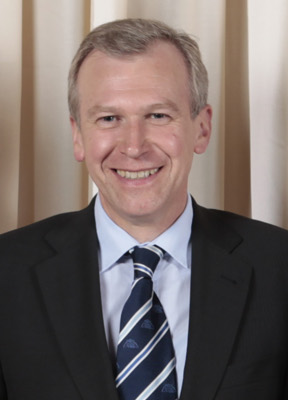
Yves Camille Désiré Leterme is a Belgian politician, a leader of the Christian Democratic and Flemish party (CD&V). He was the prime minister of Belgium from March 2008 to December 2008, and later from November 2009 to December 2011.

The Federal Government of Belgium exercises executive power in the Kingdom of Belgium. It consists of ministers and secretary of state drawn from the political parties which form the governing coalition. The federal government is led by the prime minister of Belgium, and ministers lead ministries of the government. Ministers together form the Council of Ministers, which is the supreme executive organ of the government.

Joëlle F.G.M. Milquet is a Belgian politician from the Humanist Democratic Centre (CDH).

Federal elections were held in Belgium on 10 June 2007. Voters went to the polls in order to elect new members for the Chamber of Representatives and Senate.

Herman Achille, Count Van Rompuy is a Belgian politician who served as prime minister of Belgium from 2008 to 2009, and then as the first permanent president of the European Council from 2009 to 2014.
The 2007–2008 Belgian government formation followed the general election of 10 June 2007, and comprised a period of negotiation in which the Flemish parties Flemish Liberal Democratic, Christian Democratic and Flemish (CD&V) and New Flemish Alliance (N-VA), and the French-speaking parties Reformist Movement (MR), Democratic Front of Francophones (FDF) and Humanist Democratic Centre (CdH) negotiated to form a government coalition. The negotiations were characterized by the disagreement between the Dutch- and French-speaking parties about the need for and nature of a constitutional reform. According to some, this political conflict could have led to a partition of Belgium.

Events from the year 2007 in Belgium
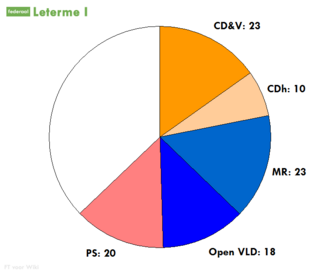
The Leterme I Government was the federal government of Belgium from 20 March 2008 to 22 December 2008. It took office when the Flemish Christian democrat Yves Leterme (CD&V) was sworn in as Prime Minister. It followed the Belgian general election of 2007 and comprised five parties: the Dutch-speaking Christian Democratic and Flemish (CD&V), the Dutch-speaking Open Flemish Liberals and Democrats, the French-speaking liberal Reformist Movement (MR), the French-speaking Socialist Party (PS) and the French-speaking Humanist Democratic Centre (CDH).
The 2007–2011 Belgian political crisis was a period of tense communal relations and political instability in Belgium, which was rooted in the differing opinions on state reform, and in the continued existence of the controversial electoral district of Brussels-Halle-Vilvoorde (BHV). Parties from the Dutch-speaking Flemish Community are in general strongly in favour for a devolution of powers to the communities and regions, and the splitting of the unconstitutional BHV district, while French-speaking French Community of Belgium is generally in favour of retaining the status quo. After the 2010 elections, the topics of public debt, deficit cuts and socio-economic reform were added to the debate, with most Flemish parties in favour of finding money by strongly reducing spending, whilst the proposals supported by most French-speaking parties also included a significant raise in taxes. The crisis came to an end in December 2011 with the inauguration of a new federal government which agreed on partition of the BHV district and on policies aimed at tackling the economic downturn. The country's continuing linguistic divide played a large part in the crisis. Several times during the period Belgium was threatened to be split up amid rising Flemish separatism.
The Van Rompuy Government was the federal government of Belgium from 30 December 2008 until 15 November 2009. Herman Van Rompuy was nominated as the first President of the European Council and resigned shortly after as Premier. It took office when the Flemish Christian Democrat Herman Van Rompuy was sworn in as Prime Minister after the Leterme I Government fell on 22 December 2008.
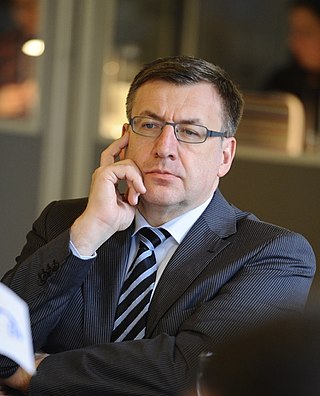
Steven Vanackere, is a Belgian politician from Flanders and member of the Christian Democratic and Flemish party (CD&V). He held the portfolios of Deputy Prime Minister of Belgium and Minister of Foreign Affairs and Institutional Reform in the Leterme II government. He is the son of Leo Vanackere, who, following a political career as a Member of the Chamber of Representatives and the Senate of Belgium, became the Provincial Governor of West Flanders in 1979. His grandfather, Remi Wallays, had also been a senator and had been a former Mayor of Wevelgem.
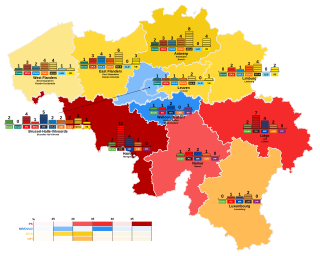
Federal elections were held in Belgium on 13 June 2010, during the midst of the 2007-11 Belgian political crisis. After the fall of the previous Leterme II Government over the withdrawal of Open Flemish Liberals and Democrats from the government the King dissolved the legislature and called new elections. The New Flemish Alliance, led by Bart De Wever, emerged as the plurality party with 27 seats, just one more than the francophone Socialist Party, led by Elio Di Rupo, which was the largest party in the Wallonia region and Brussels. It took a world record 541 days until a government was formed, resulting in a government led by Di Rupo.

The Leterme II Government was the federal government of Belgium from 25 November 2009 to 26 April 2010, and the caretaker government until 6 December 2011. It took office when the Flemish Christian Democrat Yves Leterme (CD&V) was sworn in as Prime Minister. It followed the Van Rompuy I Government which ended when Herman Van Rompuy became the first President of the European Council. It comprised five parties: the Dutch-speaking Christian Democratic and Flemish (CD&V), the Dutch-speaking Open Flemish Liberals and Democrats, the French-speaking liberal Reformist Movement (MR), the French-speaking Socialist Party (PS) and the French-speaking Humanist Democratic Centre (CDH).
Following the Belgian general election held on 13 June 2010, a process of cabinet formation started in Belgium. The election produced a very fragmented political landscape, with 11 parties elected to the Chamber of Representatives, none of which won more than 20% of the seats. The Flemish-Nationalist New Flemish Alliance (N-VA), the largest party in Flanders and the country as a whole, controlled 27 of 150 seats in the lower chamber. The Francophone Socialist Party (PS), the largest in Wallonia, controlled 26 seats. Cabinet negotiations continued for a long time. On 1 June 2011, Belgium matched the record for time taken to form a new democratic government after an election, at 353 days, held until then by Cambodia in 2003–2004. On 11 October 2011, the final agreement for institutional reform was presented to the media. A government coalition was named on 5 December 2011 and sworn in after a total of 541 days of negotiations and formation on 6 December 2011, and 589 days without an elected government with Elio Di Rupo named Prime Minister of the Di Rupo I Government.
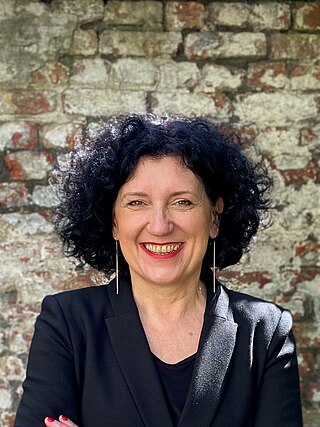
Annemie Turtelboom is a former Belgian minister, who served in the Federal Government of Belgium as a member of the Open VLD party, initially as minister for Asylum and Migration, and later Home Affairs and Justice. She has also served as minister of Finance, Budget and Energy in the Flemish Government. After leaving politics, she became the Belgian member of the European Court of Auditors, a position she has held since 2018.
Events in the year 2011 in Belgium.
Events in the year 2010 in Belgium.
Events in the year 2009 in Belgium.